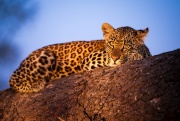Can you see wild leopards in the Western Cape of South Africa?
The idea that wild animals in Africa roam around freely all over the place, is largely false, especially in South Africa. Very few big game species are found outside of our national parks and game reserves, but Cape leopards are an exception. Despite the odds, these wild cats are still found in small, scattered populations across certain remote parts of the country.
Saving the last apex predator left in the Western Cape of South Africa is about maintaining the well-being of entire ecosystems where leopards play a crucial role.
The elusive and adaptable nature of this scarce predator has helped it to escape local extinction thus far, unlike the Cape lion which vanished forever in the mid-1800s. A few isolated populations, estimated at about 1000 Cape mountain leopards are still to be found scattered in some of the remote and rugged hills of the eastern, northern and western Cape of South Africa.
 Cape Leopard by Bushmans Kloof Wilderness Reserve
Cape Leopard by Bushmans Kloof Wilderness Reserve
Conservationists are working hard to protect these unique leopards, which have unusually large home ranges and are smaller in size relative to leopards elsewhere.
Where are the Cape Leopards hiding?
 Leopard Sighting by Leopard's LeapThe Cape leopards stick to the more remote and rocky hilltops, steering clear of the inhabited valleys, and their ranges cover wide areas - further reducing chance encounters with these felines.
Leopard Sighting by Leopard's LeapThe Cape leopards stick to the more remote and rocky hilltops, steering clear of the inhabited valleys, and their ranges cover wide areas - further reducing chance encounters with these felines.
Although leopards are known to live in surprisingly close vicinity to human settlements it is difficult to keep track of their movements, because they are mostly solitary, evasive and nocturnal.
The Cederberg region in the Western Cape is one of the main pockets where Cape leopards are still found, with only about 35 adults left. That puts the numbers at about one leopard per 120km² over an area of about 3000km².
The Cape Leopard Trust has been studying and tracking the leopards of the Cederberg region for over 10 years now, and more recently in the Boland Mountains and Gouritz Corridor (Swartberg-Gamka Corridor).
Over 50 Cape leopards have also been recorded in the Boland Mountains, in a core area of 3000km² consisting of nature reserves, game farms and private land.
The Landmark Foundation is another organisation aimed at conserving leopards of the Cape, by working with various landowners, farmers and nature reserves. The Landmark Foundation, founded in 2004, works with isolated leopard populations over a broader area, with a less intensive regional focus than the Cape Leopard Trust.
They have responded to cases where leopards need to be rescued, rehabilitated and released, as well as researching leopards found on private land (farms and wilderness areas). The Landmark Foundation's projects show that a few leopards are still to be found from the Cape Winelands and Overberg in the Western Cape, to the Outeniqua Mountains on the Garden Route, to the Zuurberg Mountains in the Eastern Cape and in parts of the Karoo.
 Leopard in Langeberg Mountains by Landmark Foundation
Leopard in Langeberg Mountains by Landmark Foundation
Lone leopards have been spotted in unlikely places like the leopard discovered in 2012 on one of the Wine Farms in Somerset West, only about half an hour from Cape Town! There was also a single leopard seen on the West Coast by Birding Africa on a 2010 trip to Mountain Mist Nature Reserve near Langebaan and a 2012 trip to Rooiels in the Aurora Mountains.
 West Coast Cape Leopard by Tertius Gous
West Coast Cape Leopard by Tertius Gous
There's a leopard on my doorstep - should I be afraid?
Should we be afraid of the Cape leopards scattered in isolated rural and mountainous areas?
These smaller leopards are not considered a threat to people and not one incidence of attack has been reported. The Cape leopards are small when compared to other leopards, weighing in at half the size of their relatives in Kruger National Park. Of course, leopards can be dangerous, especially if they are protecting their young, but given their low population density and shy nature, coupled with their smaller size, the leopards are the most vulnerable species in this equation.
So, you can relax on your stoep in the mountains, because the chances of coming across one of these rare cats are highly slim and nobody has been hurt by a Cape leopard to date. There's no need to fear being ambushed by a hungry leopard unless you're a rock hyrax or klipspringer.
 Leopard in Baviaanskloof by J Buckle
Leopard in Baviaanskloof by J Buckle
Would you rather be a leopard or a sheep?
The major threats to the survival of leopard populations in southern regions of South Africa are habitat loss, population fragmentation and human-wildlife conflict, much like many other threatened species across Africa. The main adversary to leopard survival is sheep farming on private land. In the Cape, sheep are however less likely to fall prey to leopards, than leopards likely to be killed by farmers.
Sheep farmers sustain regular losses to predators, including leopards, and retaliate by killing them off to protect their livestock. Research is being conducted to establish the extent to which leopards pose a threat and find effective methods to reduce livestock fatalities without killing the predators.
What's being done to conserve leopards?
Both the Cape Leopard Trust and the Landmark Foundation work with farmers to find sustainable solutions that address livestock losses through predation, by leopards and other wild predators. Getting private landowners on board, shifting attitudes and changing responses to locally occurring leopards are key factors in saving the remaining leopards. Both leopard trust and non-profit organisations are involved in leopard research, collaring and tracking leopards as part of their efforts to understand and manage leopard populations.
 Collared leopard, South Africa by The Cape Leopard Trust
Collared leopard, South Africa by The Cape Leopard Trust
The Cape Leopard Trust focuses on field studies and research in nature reserves and surrounding land in the Western Cape, using camera traps and GPS collars. The Landmark Foundation has collared some 24 leopards as part of its extensive research project in numerous privately owned areas. The latter is involved with rescuing leopards and reducing harm where leopards are being persecuted (through gin-traps, poisoning and hunting) and reports 41 cases where leopards have been rescued from death, but 43 cases where leopards have died.
These conservation organisations also run educational programs to create awareness of the Cape leopard and its plight. Both organisations champion leopard conservation through policy change, range expansion and human-wildlife conflict management.
Here's a great video about The Cape Leopard Trust.
Facebook Pages: Landmark Foundation and The Cape Leopard Trust.
If you liked this post, these trips cover similar ground…
- 4 Day Cape Town Tour - Winelands & Culture Package
- South Africa Tour - Cape Town to Garden Route Self Drive
- Big 5 Cape Town Safari to Aquila Game Reserve - Budget Day Tour
- 2 Day Big 5 Cape Town Safari to Aquila Game Reserve - Budget Lodge Tour
- 3 Day Big 5 Cape Town Safari to Aquila Private Game Reserve
- 4 Day Cape Town Holiday: Big 5 Safari, Wine & Peninsula Tour


 Landia is a nature and animal lover. This South African woman avoids crowds seeking out quiet places. She has worked in the African safari industry for over 16 years!
Landia is a nature and animal lover. This South African woman avoids crowds seeking out quiet places. She has worked in the African safari industry for over 16 years!












